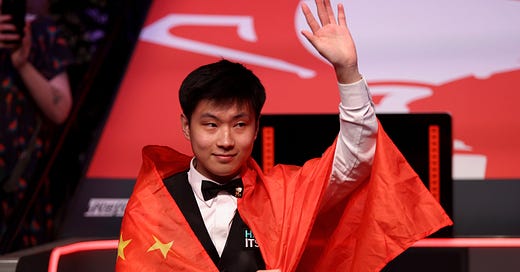Why Zhao Xintong's snooker world championship win will deliver less then the hype suggests
State policy, concerns about gambling, and changing consumer preferences will moderate what happens next in Chinese snooker
China’s Zhao Xintong has just been crowned as new world snooker champion, the first Chinese player and, indeed, the first Asian player to ever lift the trophy.
The significance of his win was potently symbolised by someone handing Zhao a Chinese flag, which he wore throughout the post-match prize giving ceremony.
In one of Britain’s former industrial heartlands, which is now struggling to even retain the tournament’s hosting rights, the projection of Chinese soft power through this simple gesture was immense.
We live in a changing world where China is ascendant.
As such, we are now amid the hype that commonly follows such a victory, with bold claims about China’s snooker future being made.
In a country of 1.6 billion people, if even just a small fraction of this them become enthused by Zhao’s victory, then the numbers will lead people to conclude that China is fast becoming a global snooker powerhouse.
However, the reality is somewhat different as a relatively small number of people in China are engaged with the sport.
China remains a basketball and mass participation sport (for instance, running and dancing) nation, not a snooker one.
There are some facilities that enable people to play snooker, but these are not easily found in many parts of the country.
Inevitably, heroes and icons are an important means through which to engage new players in any country.
However, Chinese sport is organised and governed in a different way to, for example, Britain.
The state plays a major role in deciding which sports are promoted and which are not, and how they are promoted and by whom.
We recently addressed this issue in the context of a booming Chinese esports sector.
Though Zhao’s victory will confer significant prestige upon China and its snooker, government will remain concerned about the sport’s development.
Following the player’s international ban for match fixing, officials in Beijing will want to ensure the sport doesn’t become commonly associated with gambling or poor governance, problems Chinese sport has ongoing struggles with.
At the same time, with the country’s fifteenth five-year communist plan about to be launched, the focus will be on promoting mass participation sports and event hosting.
There may thus be an opportunity to host more snooker events in China, though it seems unlikely that the sport itself will become a national priority.
One can’t deny Zhao Xintong’s talent or the nature of his victory, but for the time being at least the hype that will follow his win will be as much about hype and bluster as it is about substance.
Footnote
The above image was sourced from https://x.com/sportstarweb/status/1919639765277671676




